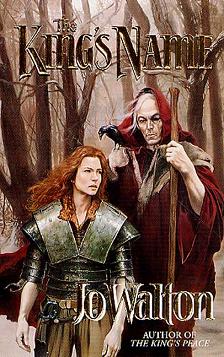The last couple of months, both before and after Sandra’s death, I’ve been busy putting her book collection into Librarything, both because I was doing that anyway for my own books and as a memorial to her tastes in reading. As you can see from the relative sizes of our collections (and not everything has been catalogued yet) she was always much more picky in which books she bought, much more discriminating. She didn’t buy books she could get from the library, nor was hesitant to recycle books once she read them if she didn’t feel it worthwhile to keep them. Whereas I’ve always had a tendency to hoard, Sandra always argued that if she felt the need to reread some cheap thriller or detective novel, it would be easy enough to buy it again and besides we’re running out of shelf space already.
What she kept therefore were books she knew she would want to reread, that she knew she would not be able to get easily and were important enough in their own right as well as to her personally. While she didn’t mind recycling modern detective novels e.g., she did collect classic Golden Age writers like Ngaio Marsh, Agatha Christie, Patricia Wentworth, Gladys Mitchell and especially Margery Allignham. These were books that she reread often enough and had enough sentimental worth to her to keep. She also had a thing for classic literature and argued that any library should have at least some Dickens or Thackeray in them.
When we merged our libraries there was remarkable little overlap: she read science fiction and fantasy, which with comics collections make up the majority of my books, but felt no need to collect them, whereas I had only a few detective books. She was also much more interested in pure quill horror than I was, with Peter Straub and Stephen King amongst the modern writers being particular favourites, but where her preferences mostly lay with the Victorian/Edwardian and pre-war writers (Benson, M. R. James, Lovecraft, Le Fanu, that lot). She also collected classic humour writers, again with the emphasis on those eras (Benson again, the Mitford sisters, Waughg, classic New Yorker writers like Thurber or Edmund Wilson). She liked social history, if it was abour regular people, especially women and their lives and not too dry and again, especially if it was about 19th century or prewar Britain. There are the science and natural history books, geology especially (Fortey) and oceanology (sucker for squid), the country and travel classics (bit of Bryson, Eric Newby), the cook and gardening books (she was keen and gifted in both departments and thank god my father is the same in the latter or i would’ve no hope of keeping up the garden), also quite a few of those glossy historical thrillers that have been all the rage the past decade, a few other miscellaneous bits and bobs. It’s a collection that’s grown organically, that you can’t really fit into a specific pattern, but which does clearly shows the mind of its curator and her intentions. In many ways it’s a much more interesting collection of books than my own.
Sandra was never shy about sharing her books with me, always recommending new ones for me and through her I discovered a lot of authors: Thackeray, Trollope, Ngaoi Marsh, Richard Fortey, Dawkings, Jessica Mitford, though quite a few I resisted (Dickens for example, perhaps her favourite author). I’ve been thinking of doing a year of Dickens — one each month — in her honour but was worried it would be too limiting and doing some more entry work this afternoon gave me the idea to instead just take any book each month from her collection, starting with Kraken by Wendy Williams this month.
